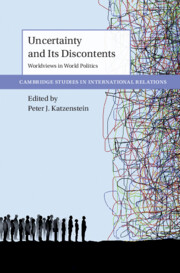Uncertainty and Its Discontents
This volume provides the first major study of worldviews in international relations. Worldviews are the unexamined, pretheoretical foundations of the approaches with which we understand and navigate the world. Advances in twentieth-century physics and cosmology and other intellectual developments questioning anthropocentrism have fostered the articulation of alternative worldviews that rival conventional Newtonian humanism and its assumption that the world is constituted by controllable risks. This matters for coming to terms with the uncertainties that are an indelible part of many spheres of life, including public health, the environment, finance, security, and politics – uncertainties that are concealed by the conventional presumption that the world is governed only by risk. The confluence of risk and uncertainty requires an awareness of alternative worldviews, alerts us to possible intersections between humanist Newtonianism and hyper-humanist Post-Newtonianism, and reminds us of the relevance of science, religion, and moral values in world politics. This title is also available as Open Access on Cambridge Core.
Peter J. Katzenstein’s work addresses issues of political economy, security, and culture in world politics. His recent books include Protean Power: Exploring the Uncertain and Unexpected in World Politics (co-edited with the late Lucia Seybert, Cambridge University Press, 2018) and Downfall: The End of the American Order? (co-edited with Jonathan Kirshner, Cornell University Press, 2022). He was elected to the American Academy of Arts and Science in 1987, the American Philosophical Society in 2009, and the British Academy in 2015. In 2020 he was named the twenty-sixth recipient of the Johan Skytte Prize.

